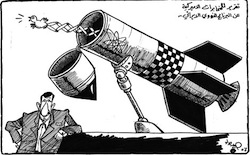The Unlikely Iranian ICBM
April 22, 2010
Featured Image
Today's top nuclear policy stories, with excerpts in bullet form.
Stories we're following today, Thursday, April 22, 2010:
Iranian ICBM by 2015? - Jeffery Lewis in Arms Control Wonk [link]
- The Pentagon submitted a report to Congress containing the claim that Iran could develop an intercontinental ballistic missile by 2015. Ah, the dreaded could.
- An excerpt from the report read: "With sufficient foreign assistance, Iran could probably develop and test an intercontinental ballistic missile (ICBM) capable of reaching the United States by 2015."
- Unfortunately, this is just intelligence community boilerplate — the same sentence has appeared in every edition of Ballistic and Cruise Missile Threat: 2009, 2006, 2003 and 2000.
- So, the bottom line is that there is not, as far as I can tell, a new estimate.
The Nuclear Security Summit: Achievements and Agenda for Action - Kenneth Luongo Testimony before the House Committee on Foreign Affairs [link]
- The April 12-13, 2010 Nuclear Security Summit in Washington, D.C. was an unprecedented event. It also was a significant success.
- This year the Obama administration and the Congress will have four unique opportunities to strengthen America’s defense against nuclear terrorism and expand the global coalition that can support the President’s goal of securing all vulnerable nuclear materials around the globe in four years. This objective received a bipartisan standing ovation at the State of the Union speech. But, if both ends of Pennsylvania Avenue follow a business as usual approach, we could end up less secure as a result.
- The key to success in driving collective and unified action on this agenda in the wake of the summit is to integrate all the necessary tools into a comprehensive, flexible, legitimate, and globally focused next generation nuclear material security framework.
George W. Bush's Nuclear Administrator Says He Would Have 'Killed' For Obama's Nuclear Budget - Max Bergmann in The Wonk Room [link]
- Yesterday, in a fawning Wall Street Journal profile of Senator Jon Kyl (R-AZ), it was further clarified that Kyl’s support for a New START treaty was contingent on absolutely massive budget increases to the nuclear weapons complex in order to “modernize” the existing nuclear arsenal.
- Kyl, as paraphrased by the Journal, deemed that there “were signs that the administration wouldn’t produce a modernization plan for the U.S.’s nuclear arsenal that he could accept."
- Kyl’s misrepresentation of reality is now getting some serious push back from George W. Bush’s very own nuclear security administrator.
- Linton Brooks, who ran the National Nuclear Security Administration from 2003-2007, said at an event held by the Arms Control Association: "You’ll hear concerns by some that the treaty may or may not be a good idea but you can’t possibly accept it because the U.S. nuclear weapons program is in disarray. And I think the administration’s answer to that is the fiscal 2011 budget with a very substantial increase for my former home, the National Nuclear Security Administration. And I will say flatly, I ran that place for five years and I’d have killed for that budget...it does put us on a very firm, firm basis… I don’t think there’s any question this [treaty] is in our interest and should be ratified."
What Will Iran Do With Nuclear Weapons? Probably Nothing - Reuters [link]
- The simple reality is that other nations cannot prevent Iran from fashioning an atomic device. Cannot, except perhaps by an all-out nuclear first strike that obliterates much of the country, or invasion and permanent occupation of a nation substantially larger than Iraq and Afghanistan combined.
- Why wouldn't a military strike solve the problem? The reasons are four: that Iran is too far from Israel for that country’s air force to handle this task; that Iran’s atomic installations are too numerous and too deeply buried for the United States to handle the task without weeks of bombardment; that any attack on Iranian atomic facilities would kill Russians, with awful international consequences; and the morality of trying to solve a political problem by dropping bombs that, no matter how accurate, will kill civilians.
- Even if bombing of Iranian atomic facilities worked in the technical sense, it would be likely to make the international situation worse rather than better.
Nuclear Arms Treaty Means Steady Work in Texas - The Dallas Morning News [link]
- The arms treaty the U.S. signed last week in Prague will keep the Pantex weapons plant outside Amarillo humming for years.
- "Anybody who's involved in dismantlement can look forward to a long career," said Hans Kristensen, director of the Nuclear Information Project at the Federation of American Scientists.
- The New START treaty signed by President Barack Obama and Russian President Dmitry Medvedev would scale back strategic arsenals by 30 percent, capping deployed U.S. warheads at 1,550. Obama also unveiled a new nuclear policy that includes general promises to step up the pace of dismantlement.
- But backing down from a Cold War posture is a painstaking process. Pantex, 17 miles northeast of Amarillo, is the nation's only facility for assembling and taking apart nuclear warheads.
- "There's plenty of work for Pantex to do for years and years to come, with or without the START treaty," said Rep. Mac Thornberry, a Republican whose district includes Pantex. He's also a senior member of the Armed Services and Intelligence committees.



